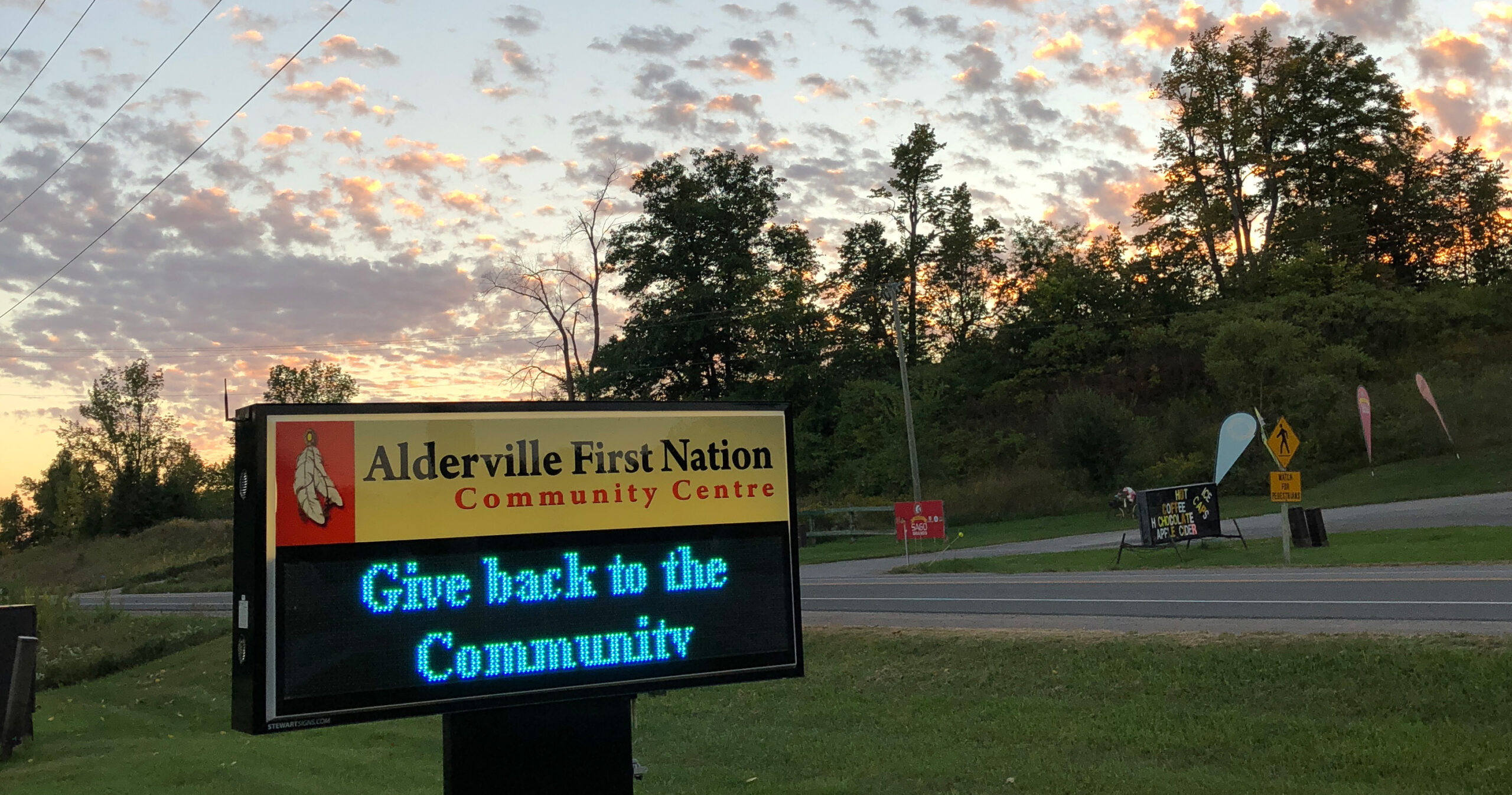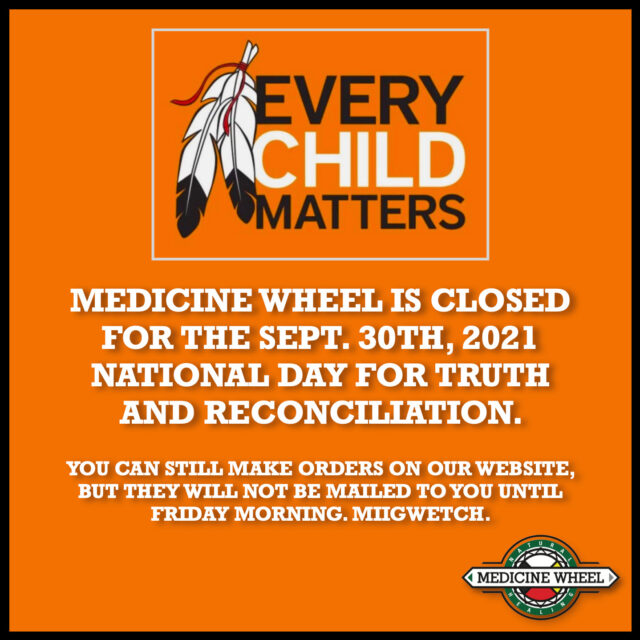About Medicine Wheel
Watch this video about the history of Medicine Wheel
Welcome to Medicine Wheel
Medicine Wheel is the first Indigenous cannabis dispensary to open in Alderville First Nation. We opened our doors on National Aboriginal Day, June 21, 2017 and have been serving customers ever since. Here are a few things that make us a unique store that’s worth the drive to Alderville to check out.
We apply rigourous testing methods to all of our products.
We sell Indigenous made cannabis products.
We believe in giving back to the community.
We have our own line of custom made products.
We put quality first in everything we do.
We engage in nation to nation trading with other Indigenous communities and brands.
We put the medicine first
We named our store Medicine Wheel consciously. Everything that we do in our store relates to Anishinaabe Medicine Wheel teachings. Our store is about health, emotion, the mind/body connection, and our collective well-being as Indigenous people. Our business brings all of that together and infuses Indigenous culture into the cannabis industry in order to benefit and empower our customers, employees and the larger community.
Cannabis dispensaries are now the major economic driver in Alderville First Nation. As we see it, economic growth should come with giving back and building for the long term. benefit of our community. We use the Medicine Wheel teachings and the seven Grandfather teachings in our own lives every day, but we also teach our customers about this outlook. It’s creating interest and it’s giving an opportunity for Canadians to get to know and relate to Indigenous people and our culture. This is all the more important as people learn more about the horrors of residential schools and the atrocities committed against Indigenous children.
When we follow the Red Road and act with integrity and honesty, our business attracts people wanting to walk that road with us. Awareness and even intrigue about what we’re up to leads to people supporting what we’re doing, and getting involved in our causes and projects. We’re bringing people to Alderville, they’re spending money, they’re learning about Indigenous issues, and it’s a mutually beneficial exchange for everyone.
We respect everyone. It doesn’t matter what colour you are, everyone works together here. In the middle of that Medicine Wheel is that crossing point where everyone is connected and this connection is at the core of our business.
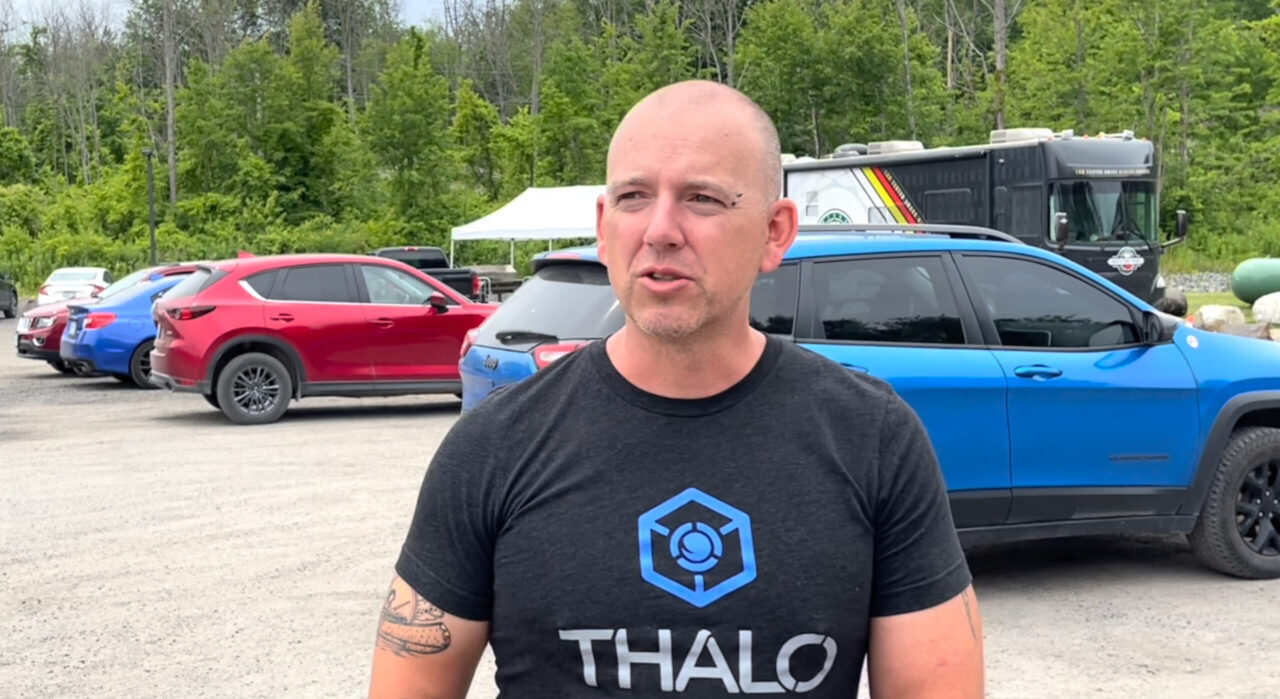
Medicine Wheel in the Covid Age: An Interview with owner Rob Stevenson
As the latest Covid-19 lockdown lifted, Medicine Wheel Natural Healing celebrated its fourth anniversary on June 21st, 2021. Making it through the pandemic was no easy task, but as owner Rob Stevenson explains, Medicine Wheel is changing and adapting with the times.
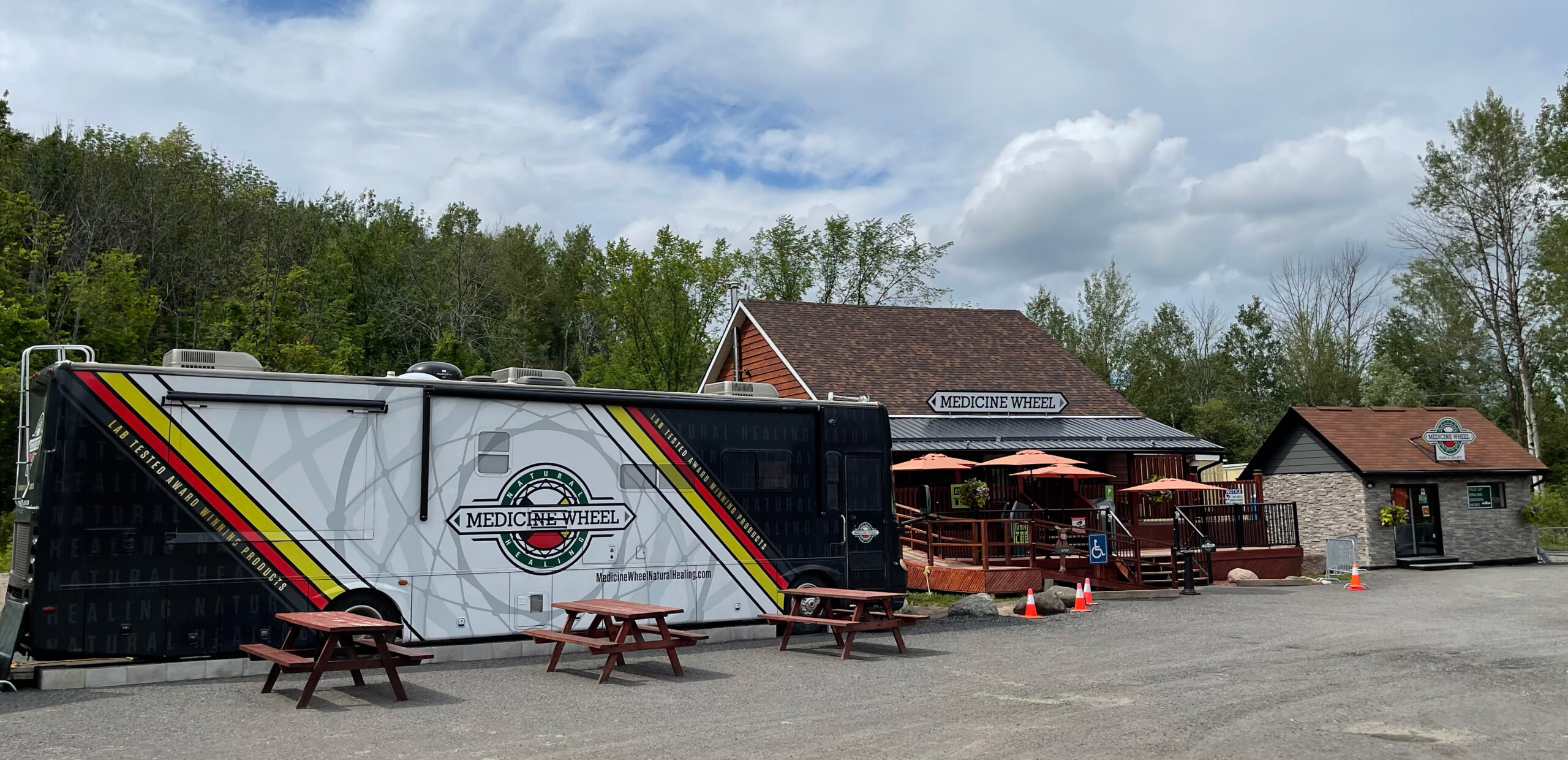
Competition and the other stores in Alderville
The pandemic was not the only thing that changed business patterns in Alderville. When Medicine Wheel first opened its doors, the parking lot was regularly overflowing and the instore line up often stretched all the way to the road. That was when Medicine Wheel was the first and only cannabis dispensary in Alderville. Now there’s over a dozen dispensaries in the community. Stevenson has a positive outlook on the larger growth of the Indigenous cannabis industry. “One of the things that I have always done is to support other people in my community getting into the cannabis industry. That has definitely affected my business here in Alderville. It slowed Medicine Wheel’s growth down, but it spread the wealth around in our community, and I am okay with that. I’ve got enough to keep me happy, and I’m glad that other families and businesses are starting to prosper from this industry.”It’s not just the dispensaries that make up the industry. In Alderville, there are at least four different businesses doing cannabis extractions and processing, many different growers, and increasingly, cooks and bakers. Stevenson estimates that of the 300 or so on-reserve members living in Alderville, about half are directly benefiting from the cannabis industry. These benefits come in many forms, including from owning a cannabis business, being employed by one, providing services like cleaning, security, or snow-clearing to the industry, or by benefiting from the increased traffic that’s been flooding into the community’s arts and crafts shops, convenience stores, and gas stations.The Indigenous cannabis industry in Alderville is now facing bigger challenges and issues that require working together as a nation. Chief among them is responding to the competition of the more than 1000 cannabis shops licensed by the Province of Ontario. Stevenson considers the placement of some of these stores a deliberate strategy to reduce the economic gains of the “red market.”“The government’s been very smart,” according to Stevenson. “They could have come after us, and just started raiding every single store, but that would have created push back from Indigenous communities. It would have created a lot of legal challenges and the media coverage would make them look bad. So instead, they’re surrounding the reserves with all of these Provincially licensed dispensaries and they’re trying to take us out through economic attrition. There’s five cannabis stores in Coburg, and in Peterborough there’s a dozen of them.” Stevenson continued: “It’s not the people across the road that are my competitors, they’re my neighbours. Our real competitors are the OCS government stores that are popping up around our community. The question becomes how do we draw people from urban areas that are used to having close access to government cannabis and shopping online? How can we bring them out to Indigenous communities and get them to spend their money here with us? That’s the tricky part now.”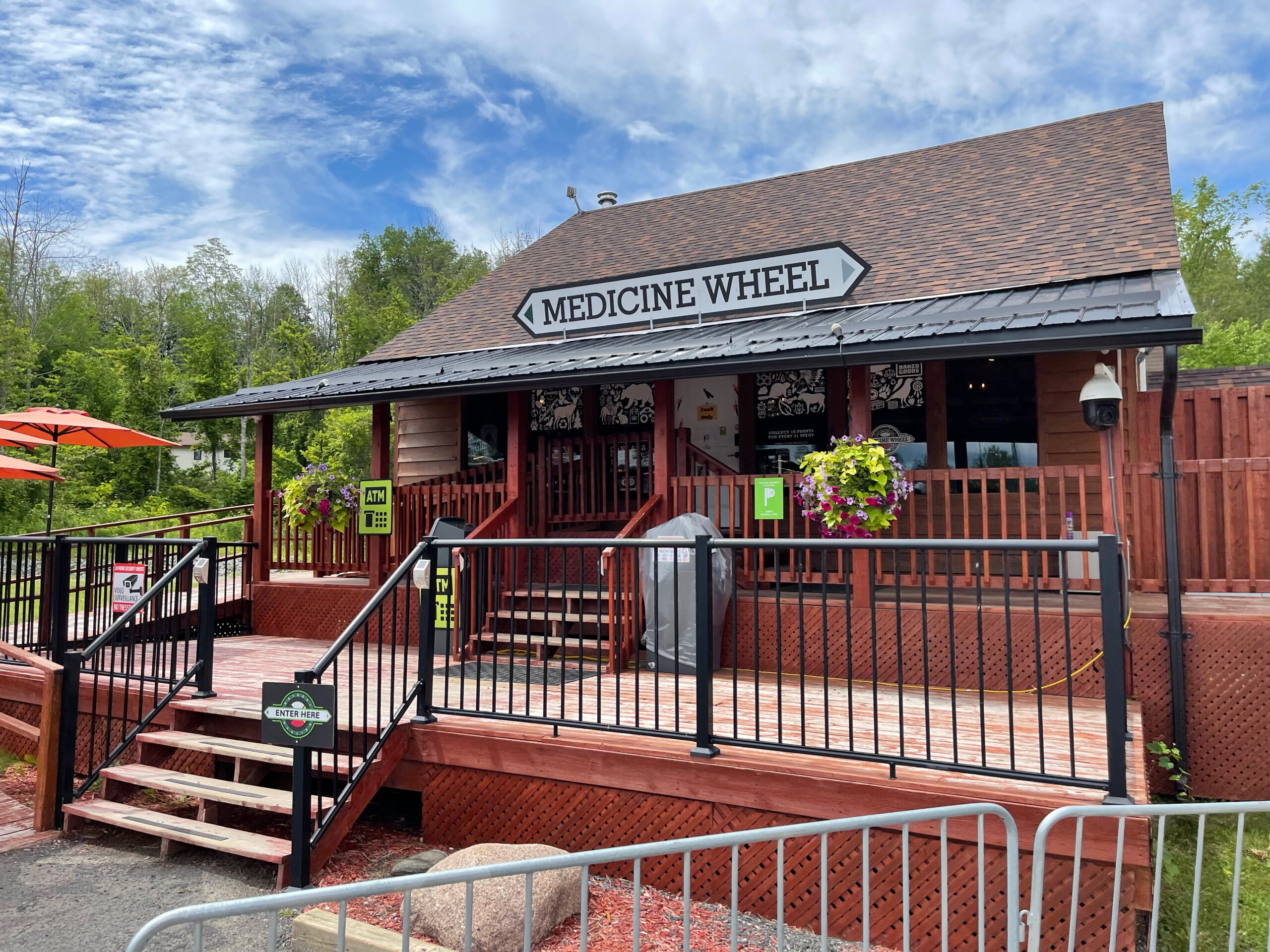
Next Steps for growing the Indigenous Cannabis Market
The competition with government stores is not just being fought out in terms of pricing, quality, and the nature of the products and services being offered. Stevenson thinks that the real leverage that Indigenous people have in the cannabis industry lies in what he terms “jurisdictional arbitrage” – the ability of “Indigenous people to use our rights to benefit our community through control of our own laws, medicines, economy and lands.” With the right regulatory framework, the safety and quality of Indigenous products can be assured, and the wealth from the industry will stay within the Indigenous communities where it was created. Stevenson predicts that the next steps in the Indigenous industry will be an increase in Indigenous nation-to-nation trading and the growth of Indigenous cannabis brands. As the industry matures, Stevenson says that he would like to see Indigenous dispensaries selling only Indigenous products. “That way, the economic benefits will stay within our communities and we can prosper from this industry over the long term.” Already there has been a noticeable increase in the quality and number of products from Indigenous sources. However, Stevenson wants these products to be safe and tested, because “to compete with Canada, we have to rise to their level in our own way. We have a great advantage on the medicinal side because none of the Provincial recreational dispensaries are allowed to discuss the medicinal benefits of cannabis. Whereas for us, cannabis is a medicine. It might not be “traditional” but it’s a gift from creation, and it’s a powerful plant-based medicine that we have every right to use as we see fit.”Because Indigenous producers don’t operate through Canada’s LP system, Medicine Wheel is able to create a whole array of medicinal products that you can’t get at OCS stores. Stevenson explains: “At the OCS, 10 milligrams of THC is the maximum dose that any serving of an edible can have. On First Nations territories we can go higher than that and I think it’s healthier to have higher doses for people that need to be medicated. I know I need a heck of a lot more than 10 mg of THC in an edible. So am I going to have to eat 10 OCS chocolate bars and get diabetes from all the sugar? Personally, I would rather have a higher dose edible and eat less of it to get the same effects.”New Indigenous Brands lead the way
Medicine Wheel is focussed on replacing its non-Indigenous cannabis products with Indigenous ones that are centred on the medicinal aspects of cannabis. One way in which the store does this is through the Rick Simpson Oil (RSO) it manufactures. RSO is a strongly medicinal product which is mostly used to treat cancers or other serious medical problems. Medicine Wheel used to have a compassion program in place for people who couldn’t afford the $40 a gram price and this brought the price down to $25 a gram. Now, in order to make the product affordable to all, the RSO is $25 across the board and is manufactured locally on the territory. As Stevenson points out, the benefits of Medicine Wheel’s RSO go beyond its price. “Our RSO is food grade quality. There’s a minimum of three different varieties of flower mixed into the oil so it creates a robust full plant spectrum effect that provides the best entourage effects. A recent batch tested with levels of 71% THC. And it’s not green, it’s made from bud. It’s a fantastic product.”Another line of products launched by the company is the ICR or Indigenous Cannabis Revolution. This brand carries high quality vape cartridges, hash, shatter and some other special concentrates like Delta-8 and CBD products. The ICR line of extracts join those of other Indigenous brands in the store. Igloo Brand, Alderville’s own Sid Viscous diamond sauce and diamond resin extracts, as well as the High Roller brand are all carried by Medicine Wheel and are available for online purchasing. Medicine Wheel is also selling 10 different kinds of Indigenous made hash, and 25 different vape cartridge flavours through the ICR line. Medicine Wheel hasn’t forgotten about flower either, with a selection of 25-45 high-quality flowers kep on hand at all times. Like other Indigenous dispensaries, the Wheel also offers $100 ounces, but with a twist: even the $100 ounces are safe, lab tested, and have their potency levels marked on the packaging. All flower strains are tested for potency, mold, and pesticides to ensure consumer safety. Prices range from the $6g range all the way to some $18g strains.The flower is sold in childproof bags which keeps the project fresh and create less waste. Although other dispensaries will weigh out the product in front of customers, there’s a sanitary issue at play because every time you open that container to fill it for someone, you’re drying the product out and risking contamination. At Medicine Wheel, the flower is dried to the desired moisture level and packaged for sale. Medicine Wheel has also continued the production of its award winning Mukwa line. This product line features a variety of different medicinal tinctures and topicals. The Mukwa brand was created in partnership with some Mohawks in Tyendinaga back in 2017, and according to Stevenson, “since day one it’s been one of our strongest selling brands.” The product is not super-high in THC, but it is created from a full spectrum cannabis extract rather than using isolates and distillates, which provides a powerful “entourage effect” from the wide variety of cannabinoids present in the tincture. Medicine Wheel also has its own line of THC and CBD gummies and also stocks those of Creator’s Choice in Wahnapitae. Next on the agenda is moving a baker and a chef into a specially made industrial kitchen to provide fresh THC edibles to be sold at the store.After Covid
Now that the Covid-19 Pandemic appears to be subsiding, Stevenson’s focus is returning to the Medicine Wheel store front as a place to not only educate consumers about the medicinal values of cannabis and the benefits of different Indigenous made products, but to promote Indigenous culture and traditions. The Medicine Wheel POS system that tracks every sale, all of our inventory and every single customer. With recent efforts to relaunch the Medicine Wheel website, the POS is now integrated with the online store, and enables a fast and easy online purchasing system. Purchases can still be picked up at the store, but they can also be shipped across Canada. According to Stevenson, the information held on the POS system “helps us to decide what products we want to carry, what products are working to treat what ailments, and it gives us a communication path to our members.” Medicine Wheel now has over 60,000 members now, and each new customer is registered and given a membership card. When customers come in their membership card is scanned and the purchase is made. As a way to bring even more benefits to members, Medicine Wheel has created a buy-in loyalty program. The program gives its members points for every purchase made, and these points allow you to get new items for free.